 Breast feeding and emotional eating. Pic from canva.com Breast feeding and emotional eating. Pic from canva.com Today we talk about emotional eating and emotional hunger. But what is this about emotional hunger? Is there more than one type of hunger? According to the author, Jan Chozen Bays of Mindful Eating, there are five types of hunger: Emotional hunger: we learned to feel this type of hunger from an early age, since we were babies. When we associate food with our emotional states, loneliness, sadness, frustration, anger, boredom, restriction of pleasure, and joy. What do mothers do when their baby cries? The first thing they do is to offer breast milk. Even though he may be crying for other reasons. Breast milk is sweet and has fat in its composition. The baby learns from an early age that any problem he has, the best thing to do is to eat first and then face the problem later. This is how our need to look for food for comfort is born when problems arise, instead of solving the problem itself. And then there is usually a feeling of guilt. Hunger of the mind: this type of hunger can arise when we go on restrictive diets and realize that we have to cut back on carbohydrates, or sugar or increase the consumption of protein, for example. This type of hunger can arise due to all the information that we are accumulating about what to eat, how to eat and why to eat. Sensory hunger: this hunger arises when we receive signals through our senses, vision, hearing, smell and taste. It is that hunger that arises, for example, when we are in the cinema and we hear people chewing popcorn and we feel like eating them too, even if we do not feel physical hunger. Or we pass the pastry, and we see those cakes that look great or the smell of fresh bread. Stomach hunger or physical hunger: this is natural hunger, physiological hunger, regulated by hormones. In this type of hunger the body needs energy, and sends signals to the stomach, which gives us the impression of an “empty stomach”, and makes us look for food. This type of hunger should not be ignored. When we feel this type of hunger, we have no specific desires for a particular type of food and we feel a feeling of satiety when we eat. Hunger hormones There are many hormones that control appetite. In the intestine, hormones such as ghrelin, GLP 1, PYY, OxM send signals to the brain (in the hypothalamus) and thus control appetite. Insulin and CCK are hormones released by the liver that also influence appetite. Adipocytes (cells that store fat, it is curious that when we put on weight, these cells increase in number and when we lose weight, they only reduce in size, but never disappear) and send signals to the hypothalamus through leptin, adiponectin, interleukins. Thus, the hypothalamus modulates eating behavior. In short, ghrelin is the hormone that makes us eat, increasing our appetite. And leptin, the hormone that makes us stop eating. But if everything were that simple, nobody would overeat and nobody would be overweight. It has been found that the function of leptin is not to stop us eating when we have a lot of fat reserve, but to increase our appetite when we have little fat reserve in our body. And you ask me ... But then why is it that after eating lunch so well, I always have a little space for dessert? Does my leptin not work? Why is there always room for dessert? According to the author and researcher of Genetics at the University of Oxford, Giles Yeo, it is due to biological adaptation. When we are satiated, our body begins to be selective in the type of food eaten. Having a preference for highly energetic foods (small portion, but rich in fat and sugar). Because in the primitive era, we did not know when it would be the next time we ate, whenever food was available, we ate as much as possible, as there would normally be a period of scarcity. There are other factors that affect the hunger hormones Other factors such as little sleep, stress and restrictive diets affect the hormones that control appetite. When we don't get enough sleep, we have less energy, and we look for high calorie density foods to compensate for tiredness. Chronic and acute stress influence appetite differently. Chronic stress usually makes us lose our appetite; while acute stress (of the moment), makes us increase appetite. Restrictive diets signal the body of danger, and in defense the body tends to save its energy expenditure to compensate and increases appetite. Thus occurring the “plateau” effect in which the weight tends to stabilize. Physical hunger vs. emotional hunger In physical hunger, the stomach rumbles, we consider food options, hunger grows little by little and we feel full when we eat. In emotional hunger, we feel an urgent need to eat specific foods in large quantities, without much time having passed since the last meal, and there is an absence of physical signs of hunger. In practice, how to identify emotional hunger and physical hunger? Pay attention to signs of hunger and satiety. There are people who, when they are hungry, are in a bad mood, others with headaches, others lose their concentration, others their stomach rumbles. It is important to recognize these signs and respond to this hunger with nutritious food. When you eat, eat calmly and slowly, without any distractions (without TV or phone) to pay attention to the satiety signal and stop eating before you feel uncomfortably too full. Before eating, ask yourself, "Do I really feel hungry?" Think about when you last ate, look at your watch and see if you really have had enough time to feel hungry again. We usually feel hungry after 2 to 3 hours after eating, depending on the nutritional composition of the previous meal. Meals with sources of protein and fiber cause greater satiety. Then, quantify your hunger, on a scale of 0 to 10, where 0 means not feeling hungry and 10 means feeling very, very, very hungry (even the stomach rumbles). The urge to eat or cravings are like waves, they grow until they reach their top and then break on the shore and disappear within 15 to 30 minutes. The best thing to do is to be distracted by any activity other than eating until the urge, the desire to eat, disappears. You can even write a list of these activities, which will be called "substitution responses" (when eating). For example, take a walk, run, read, call a friend, clean the house, clean the car, plan your next vacation, do yoga or meditation, take a relaxing bath, listen to music you like, and sing or dance. You will see that you will feel much better afterwards, because often these cravings arise when we are bored or feel in a bad mood or stressed.  Plate of cookies - emotional eating. Photo by Alireza Etemadi on Unsplash Plate of cookies - emotional eating. Photo by Alireza Etemadi on Unsplash Eating behavior Each of us behaves differently in relation to food. And that is why some people find it easier to maintain a healthy weight or lose weight than others. There are 4 types of eating behavior. I am going to present you with a scenario, and I want you to take note of the type of your behavior in this scenario. Imagine you're in a meeting and someone puts a plate of delicious chocolate cookies on the table. What would you do?
Situation 1 - it can mean that you are a person who reacts emotionally to food. In this case it is important that you practice the tips mentioned above - stop and think if you are physically hungry or not, before taking the cookie off the plate immediately. Situation 2 - you might not eat emotionally, but you may be on restrictive diets. Two types of situations can happen: if you are on a restrictive diet, you are likely to lose control and eat too much after the meeting. This type of situation can lead to eating disorders. Or, it can happen that you can get distracted and forget about the cookies. Situation 3 - you probably had a good breakfast, and are clearly more interested in the meeting than in eating. Situation 4 - in this case, you are not aware of what you eat. This type of people when they gain weight they don't know why. You have no idea of your eating habits. To start becoming aware, keeping a food diary can help. You can download a food diary here. Intuitive eating Intuitive Eating is an approach that can help you improve your relationship with food and living in tune with your body and mind. It helps you to understand the signs of hunger and satiety and to respect your individual needs. And to make it less influenced by external factors, such as models, diets, social networks, etc. This type of approach was created by two American nutritionists Evelyn Tribole and Elyse Resch who also published the book Intuitive Eating. According to these authors: “intuitive eating is an inside job - it’s about listening to the messages of the body through interoceptive awareness. When you focus on weight, it interferes with the process of becoming an Intuitive Eater.” In this book you can find in detail the 10 principles for intuitively eating. They are not rules, but just a guidelines. 10 Principles of Intuitive eating
Intuitive eating is an inside job - it’s about listening to the messages of the body through interoceptive awareness. When you focus on weight, it interferes with the process of becoming an Intuitive Eater. Practical tips to help you cope with emotional eating Plan your weekly menu and your shopping list. When we get hungry, it is very easy to fall into temptations, and choose less healthy and convenient foods. Preparing and planning your food in advance will help you to make healthy and balanced food choices. You can start planning your menu today, download this template I created for your weekly menu here. When you go to the supermarket, do not go hungry, as you will be tempted to buy foods high in fat and sugar, foods off your shopping list. Download your shopping list here. When you're out and about, pack a healthy snack in your bag. An apple, rice crackers, a small bag of nuts or raisins, for example. You will save money and thus ensure that you have something nutritious to eat. Not spending so many hours without eating. Avoid having less nutritious foods at home, such as crisps, chocolates and cookies, so that you do not fall into the temptation to eat them at home. There will always be an opportunity to eat this type of food on festive occasions. At home, have a bowl of fruit on the kitchen counter and plain natural yogurts in front of the fridge. Cut vegetable sticks (like carrots, cucumbers) and accompany with hummus, for example or cream cheese. Keep less healthy foods out of sight. Have a snack when you're hungry, when it's been at least 3 hours since your last meal. Eating frequently throughout the day will control your appetite better. Do not let your hunger reach the maximum level, as you will have an enormous desire to eat large amounts of food at once, and you may even feel uncomfortable. Drink water first, before eating. Because as mentioned earlier, we often confuse hunger with thirst, so drink a large glass of water and, if after ten minutes you still feel hungry, have a snack too. Eat balanced meals, always with a protein source, such as meat, egg, fish, legumes (beans, beans, lentils), dairy products, and a source of fiber, such as vegetables. Protein and fiber will cause a feeling of satiety that lasts longer. Do not use food as a reward. For example, if I'm promoted at work, I'm going to eat a pizza. Food is just food and not a prize. Food must be used to nourish our body and mind. You can reward yourself in other ways, other than with food. Our body weight is the result of thousands and thousands of food choices that we have made over the years. And our biology influences the choices we make. ” It is not for a day that we ate less or more healthier foods that we will put on weight or lose weight. Our body weight depends on thousands and thousands of choices we make, day after day, week after week, month after month, year after year. There is no perfection, but progress. Identify the small changes in your behavior and eating habits that you can easily put into practice today and maintain them for the long term. Being aware of what you eat, and realizing that food is a source of nutrition and not a refuge from your problems or boredom is essential for you to have a healthy relationship with food and reduce your emotional hunger.
My mission as a nutritionist is to educate, motivate and find strategies that work for you and that help you achieve your nutritional goals, whether it’s to gain or lose weight, gain muscle, improve some metabolic conditions, such as diabetes, cholesterol, hypertension ; among other conditions. Joana Jardim UK Registered Dietitian MSc Clinical Nutrition
1 Comment
Leave a Reply. |
Categories
All
AuthorHi, I'm Joana, a Portuguese registered dietitian in the UK. I am passionate about helping others achieving their health goals. Archives
June 2024
|

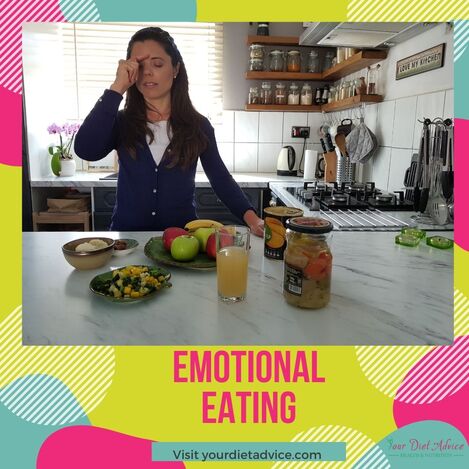
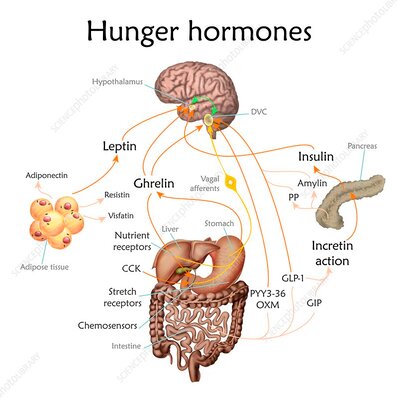

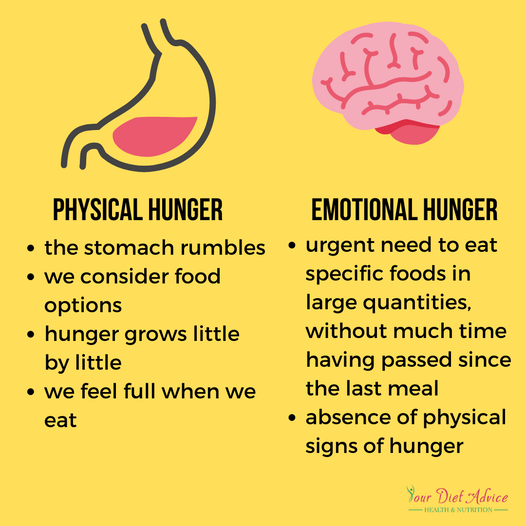
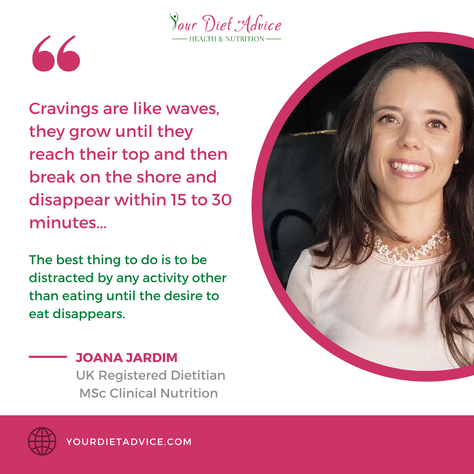
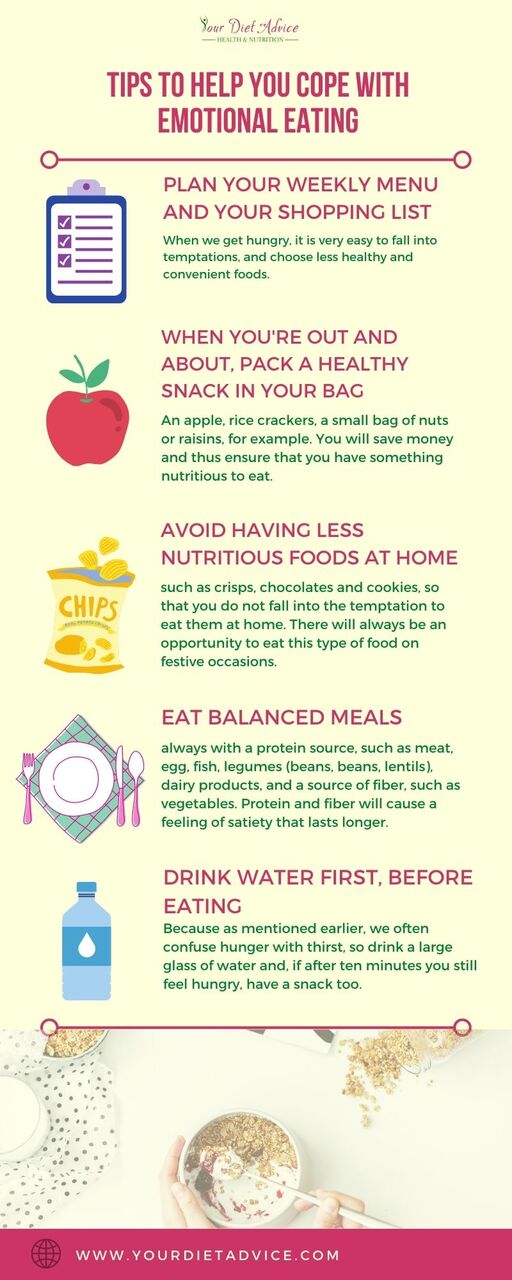

 RSS Feed
RSS Feed